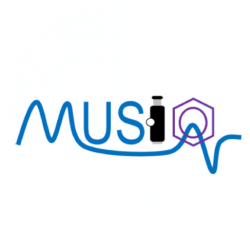2D FWM cryo-microspectroscopy of individual colloidal quantum dots, fluorophores, and biomolecules
Position Filled
Supervisor Professor Wolfgang Langbein
Cardiff School of Physics and Astronomy
Cardiff University is looking for an Early Stage Researcher within the School of Physics and Astronomy for the collaborative research project MUSIQ in the frame of the EU Horizon2020 Marie Skłodowska-Curie Actions Innovative Training Networks H2020-MSCA-ITN-2018 “MUSIQ: Multiphoton Microscopy and Ultrafast Spectroscopy: Imaging meets Quantum” European Training Network (ETN).
MUSIQ is an innovative ETN with the unique vision of developing the next-generation optical microscopy exploiting quantum coherent nonlinear phenomena. Through 15 ESR research projects, MUSIQ will establish an intersectoral training and research programme at the physics/chemistry/life science interface with partners from 9 European countries. MUSIQ ESRs will enrol on PhD degree programmes and be employed for 36 months in a beneficiary organisation. The consortium brings together a unique team of world-leading academic groups and industry, at the forefront of optical microscopy technology developments merged with fundamental understanding of ultrafast coherent light-matter interaction phenomena, development of quantitative image analysis tools, and biomedical/pharmaceutical real-world applications. MUSIQ aims at creating the next generation of skilled well-connected scientists that will pioneer the ‘quantum microscopes of tomorrow’.
Specific to MUSIQ, in addition to their individual scientific projects, all ESRs will benefit from further continuing education through a dedicated training program in the various fields of expertise of the consortium partners, which includes secondments, a variety of training modules, transferable skills courses and active participation in workshops, conferences and outreach activities.
As part of the position, the successful candidate will be enrolled as a staff candidate for a PhD at Cardiff University.
Conditions of eligibility of researchers
ETNs recruit a specific type of researcher. Successful candidates:
- MUST at the date of recruitment, be in the first four years (full-time equivalent research experience) of their research careers and have not been awarded a doctoral degree. ‘Date of Recruitment’ means the first day of the employment of the researcher (i.e. contract starting date). ‘Full-Time Equivalent Research Experience’ is measured from the date when the researcher obtained the degree entitling him/her to embark on a doctoral degree programme.
- MUST NOT have resided or carried out their main activity (work, studies, etc.) in the country of the recruiting organisation for more than 12 months in the 3 years immediately before the recruitment date. Compulsory national service, short stays such as holidays, and time spent as part of a procedure for obtaining refugee status under the Geneva Convention are not taken into account.
English language: It is a requirement that applicants will show that their ability to understand and express themselves in both written and spoken English is sufficient for them to derive the full benefit from the network training, and to embark on a doctorate at a UK University.
Applications are encouraged from all sectors of the community, reflecting the consortium’s commitment to equality and diversity. Female candidates are especially encouraged to apply. Employment procedures and contracts will conform to the European Charter for Researchers and the Code of Conduct for the Recruitment of Researchers.
This is a full-time position (35 hours per week), fixed-term for 3 years, with a flexible start date between 1st June 2019 to 1st October 2019.
For informal enquiries please contact Prof Wolfgang Langbein [email protected]
It is anticipated the basic annual salary will be in the region of £37,258 per annum, exact salary will be confirmed upon appointment. In addition to basic salary, Marie Sklodowska-Curie Early Stage Researcher positions also attract mobility and family allowances, dependent on individual circumstances.
Date advert posted: Thursday, 7 March 2019
Closing date: Friday, 17 May 2019
See below for full job description and person specification. Applicants must confirm and be prepared to provide evidence that they meet the Marie Sklodowska-Curie Eligibility criteria as specified above.
As well as applying to the local institution, please send your CV with a Cover Letter to the Consortium Coordinator email: [email protected]. In the Cover Letter please indicate for which project you are applying and provide a brief motivation as to why you wish to become an ESR within MUSIQ. Please be aware that your CV may be shared with the named beneficiaries within the consortium, as part of the application review process, to ensure an open, transparent and merit based recruitment. Please see the full MUSIQ Data Privacy Notice.
Please be aware that Cardiff University reserves the right to close this vacancy early should sufficient applications be received.
Cardiff University is committed to supporting and promoting equality and diversity and to creating an inclusive working environment. We believe this can be achieved through attracting, developing, and retaining a diverse range of staff from many different backgrounds who have the ambition to create a University which seeks to fulfil our social, cultural and economic obligation to Cardiff, Wales, and the world. In supporting our employees to achieve a balance between their work and their personal lives, we will also consider proposals for flexible working or job share arrangements.
Job Description
Job Description
The objective of the project is to demonstrate and use two-dimensional cryo-microspectroscopy on individual colloidal quantum dots, fluorophores, and biomolecules (including model light-harvesting systems). The successful candidate will be trained to work with a unique measurement technique available in the research team at Cardiff. It implements femtosecond two-dimensional four-wave-mixing featuring heterodyne spectral interferometry, allowing for cryogenic sample temperatures down to 4 K. The technique has been developed and applied for experiments on epitaxial quantum dots and photonic cavity structures, towards applications in quantum information processing. This project will explore the applicability of this advanced method to biologically relevant single quantum systems. This study is important as a framework for understanding and quantifying the importance of quantum coherence effects in biological function, as well as for applications in novel bioimaging and sensing strategies.
Research
- To undertake research, e.g. by planning, preparing, setting up, conducting and recording the outcome of experiments, performing data analysis, desktop research etc.
- To conduct experiments examining biologically relevant single quantum systems with two-dimensional four-wave mixing cryo-microspectroscopy, and related quantitative data analysis and physical interpretation.
- To further develop measurement setups as required by the project.
- To participate in maintaining laboratory facilities, and assist other members of the group by sharing knowledge and expertise. Collaborate with others to tackle interdisciplinary problems in close collaboration with experts from adjacent disciplines in chemistry and biology.
- Actively participate within the research group, communicating and presenting research at meetings, through publications and other recognised avenues as appropriate, ensuring information is communicated to internal and external partners.
- To contribute to research publications and presentations as required.
- To analyse and communicate complex ideas, concepts and data using appropriate methods and packages.
- To resolve issues and support senior colleagues in devising procedures required to ensure accurate and timely reporting.
- To generate research output and contribute to the development of independent and original ideas as appropriate.
- To maintain and update area of specialist knowledge, researching and critically appraising relevant literature within the area.
Other
- To undergo personal and professional development that is appropriate to and which will enhance performance.
- Specific to MUSIQ, in addition to their individual scientific projects, all fellows will benefit from further continuing education, which includes secondments. In this project, secondments will include a 1-month placement at Politecnico di Milano (Italy) to measure large ensembles of the single quantum systems with two-dimensional electronic spectroscopy (2DES) and compare results, a 3-months placement at ICFO (Barcelona, Spain) to study the single quantum systems with single molecule fluorescence techniques, and a 2-months placement at Light Conversation (Vilnius, Lithuania) to test and train on laser sources for 2DES.
- Any other duties not included above, but consistent with the role.
Person Specification
N.B. Recruiters use the person specification as a device for short-listing. Therefore all candidates should include a supporting statement to demonstrate how they meet all of the essential criteria.
In addition to the criteria listed below, please note the Marie Sklodowska-Curie eligibility criteria specified in Additional Information.
Essential Criteria
- A Masters degree in a relevant discipline, or equivalent relevant research experience.
- Expertise in atomic, molecular, and/or solid state physics, and optics.
- Knowledge of research methods and techniques within specialist field.
- Proven ability to analyse complex information and summaries appropriately.
- Proven communication skills, including presentation to various audiences.
- Excellent organisational and team-working skills.
- Proven ability to demonstrate creativity, innovation and accuracy within work.
Desirable Criteria
- Expertise in nonlinear optical spectroscopy and/or microscopy.
- Expertise in programming, specifically in c/c++ and matlab
- Expertise in optical and electronic design
- Relevant laboratory experience.
Additional Information
ESR eligibility criteria
There are strict eligibility requirements for the ESR PhD positions. Please ensure that you qualify before applying, as ineligible candidates cannot be considered.
Applicants should not have resided or performed their main activity (work, studies, etc.) in the country of the host institution for more than 12 months in the 3 year period immediately prior to the start date of the PhD research.
Applicants for the ESR PhD positions should be in the first 4 years (full-time equivalent) of their research careers and not yet have been awarded a doctorate. This 4 year period is measured from the date of obtaining the degree which would formally entitle to embark on a doctorate.
Conditions of international mobility of researchers: Researchers are required to undertake trans-national mobility (i.e. move from one country to another) when taking up the appointment. At the time of selection by the host organisation, researchers must not have resided or carried out their main activity (work, studies, etc.) in the UK for more than 12 months in the 3 years immediately prior to their recruitment. Compulsory national service, short stays such as holidays, and time spent as part of a procedure for obtaining refugee status under the Geneva Convention are not taken into account.
For more information on MSCA-ITN, visit http://ec.europa.eu/research/mariecurieactions/index_en.htm
Applicants must confirm and be prepared to provide evidence that they meet the Marie Sklodowska-Curie eligibility criteria as specified above.
English language: It is a requirement that applicants will show that their ability to understand and express themselves in both written and spoken English is sufficient for them to derive the full benefit from the network training, and to embark on a doctorate at a UK University.
The Marie Sklodowska-Curie programme offers highly competitive and attractive salary and working conditions. The successful candidates will receive a salary in accordance with the Marie Sklodowska-Curie regulations for early stage researchers.
Exact salary will be confirmed upon appointment.
Exact salary will be confirmed upon appointment. In addition to their individual scientific projects, all fellows will benefit from further continuing education, which includes internships and secondments, a variety of training modules as well as transferable skills courses and active participation in workshops and conferences.
How to apply for the job
Please apply to the job via the the local advert: http://krb-sjobs.brassring.com/1033/ASP/TG/cim_jobdetail.asp?partnerid=30011&siteid=5460&AReq=8337BR

